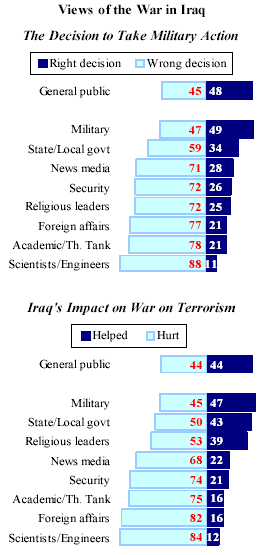
Opinion leaders express deep doubts about the decision to go to war in Iraq, and most of them believe the war has undermined the struggle against terrorism. Influentials are divided on whether to keep troops in Iraq, but most think that the U.S. will ultimately fail in its effort to create a stable democratic government there. In contrast, the public is more divided on whether the war was a mistake and on how it has affected the war on terrorism. A small majority of the public believes that the U.S. will ultimately succeed in establishing a democratic government in Iraq.
Only one group of influentials, military leaders, is divided over the decision to go to war (49% right decision, 47% wrong decision). In all other groups at least 59% think using force was the wrong decision. Similarly, only in the military sample is there an even division on the impact of the Iraq invasion on the war on terrorism. Half or more in other groups think the war has hurt America’s effort to combat terrorism.
The attitudes of influentials toward the war, like their views of Bush, are politically polarized. Democratic members of the influentials sample are nearly unanimous in the view that the war was a mistake (93%), while a smaller majority of Republicans (72%) think it was the right thing to do. A similar split is seen on Iraq’s impact on the war on terrorism and on the prospects for eventual success in Iraq.
Opinion leaders generally believe the war was a mistake, but they are divided over whether to maintain troops in Iraq. About as many favor a withdrawal of all or some U.S. forces in Iraq (45%) as say the troops should remain, or even be augmented (49%). Except for scientists and engineers, fewer than a quarter in all groups favor a complete U.S. troop withdrawal. Similarly, just 26% of the public supports a total pullout of forces.
Iraq’s Future

The opinion leaders are somewhat skeptical that Iraq will remain a single nation in the future. Military officers and security specialists are the most likely to think Iraq will hold together (55% and 52%, respectively), while religious leaders and scientists and engineers are most apt to think the country will end up divided (58% and 68%, respectively). Among influentials, Republicans (67%) are much more likely than Democrats (30%) to think the country will stay intact.
Asked what a future democracy in Iraq might look like, large majorities in nearly all influential groups believe it would be a religious rather than a secular democracy. Only among religious leaders do as few as half expect an Iraqi democracy to be religious in nature — but even among this group, only 36% think it would be a secular democracy.
Bush’s Calls for Democracy
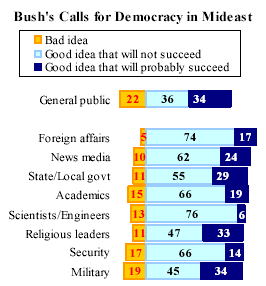
By wide margins, both the American public and opinion leaders believe that George W. Bush’s calls for more democracy in the Middle East are a good idea, but there is widespread doubt about whether this idea will ultimately succeed, especially among opinion leaders. Except for religious and military leaders, majorities in every group say that Bush’s calls for more democracy are a good idea that will probably fail; even among those two groups, pluralities express this view.
The general public is more divided over this question than any influential group. While a third (34%) are optimistic that Bush’s calls for democracy will probably succeed, 22% believe his calls for democracy are a bad idea altogether.
Assessing the Terrorist Threat
More than four years after the 9/11 attacks, most influentials feel the ability of terrorists to launch another major strike against the U.S. remains undiminished. Only among military leaders does a slim majority (51%) say that the ability of terrorists to attack the U.S. is less than it was around the time of 9/11.
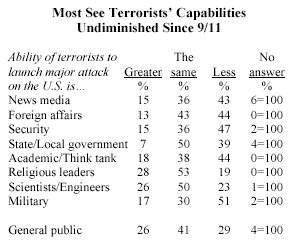
The public is skeptical that the terrorists’ capabilities to attack have been degraded. Overall, 41% say terrorists have the same ability to launch a major strike on the U.S., 26% believe terrorists now have greater ability to engineer a major attack, while just 29% say terrorists’ capabilities are less than they were at the time of 9/11.
Large majorities of influentials say that the absence of another terrorist attack on the U.S. since 9/11 is either a result of good luck or the fact that America is inherently a difficult target for terrorists, rather than due to government efforts to protect the country. Overall, about half (48%) credit luck, and a quarter (24%) say the U.S. is a difficult target, while only one-fifth (22%) say the lack of terrorist attacks is due to the government’s good job in protecting the country. Military officers and state and local government officials are slightly more likely than other leaders to credit the government’s efforts for preventing a new terrorist attack.
The general public’s views are not particularly different from those of the influentials, with nearly half (45%) saying the U.S. has been lucky thus far, and a third (33%) giving the government credit (33%). More generally, the public gives the government fairly good marks for its efforts to reduce the threat of terrorism. Two-thirds (67%) say the government is doing at least “fairly well” in protecting the country (17% “very well,” 50% “fairly well”), down from 2001 (following the attacks) but largely unchanged over the past year and a half.
Public More Willing to Accept Torture
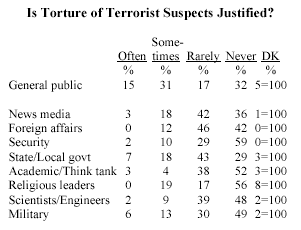
The American public is far more open than opinion leaders to the use of torture against suspected terrorists in order to gain important information. Nearly half of the public (46%) says this can be either often (15%) or sometimes (31%) be justified. This is consistent with results of Pew surveys since July 2004.
By contrast, no more than one-in-four in any of the eight elite groups believes the torture of terrorist suspects can be sometimes or often justified. Strong opposition to torture is particularly pronounced among security experts, religious leaders and academics, majorities of whom say the use of torture to gain important information is never justified. Nearly half (48%) of scientists and engineers also take this position, as do military leaders (49%).
Responsibility for Prisoner Abuse
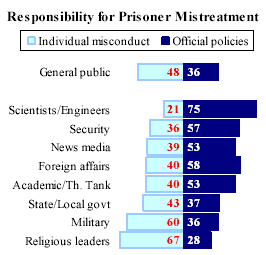
While influentials largely agree in opposing the use of torture, opinions differ widely on where the responsibility lies for cases of prisoner mistreatment in Iraq and Guantanamo Bay. By more than three-to-one (75%-21%) scientists and engineers say that these abuses were mostly the result of official policies. A majority of security (57%) and foreign affairs experts (58%) agree, along with about half of academics (53%) and news media leaders (53%). But most military (60%) and religious (67%) leaders believe cases of prisoner mistreatment were mostly the result of misconduct on the part of soldiers and contractors.
The general public is divided over this question — 48% believe soldiers and contractors are mostly to blame, while 36% blame official policies. Not surprisingly, the public’s views are highly differentiated by party. By a 67% to 20% margin, Republicans say these abuses mostly reflect misconduct by soldiers and contractors. Democrats and independents are more than twice as likely as Republicans to blame official policies (44% and 46% respectively).
Terrorism and Civil Liberties
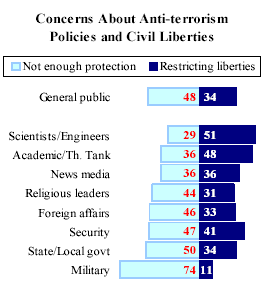
Opinion leaders and the public are split over the proper balance between protecting the nation against future terror attacks and maintaining basic civil liberties for all Americans. Asked which concerned them more about the current anti-terrorism policies, 48% of Americans are more concerned that they have not gone far enough to adequately protect the country, while 34% worry more that they have gone too far in restricting the average person’s civil liberties.
Several of the influential groups interviewed divide over this question in much the same way, but there are some important exceptions. Most notably, military leaders overwhelmingly say the bigger concern is inadequate protection against future attacks — 74% take this view. By contrast, roughly half of scientists and engineers (51%) and academics (48%) worry more that policies have gone too far in restricting civil liberties.
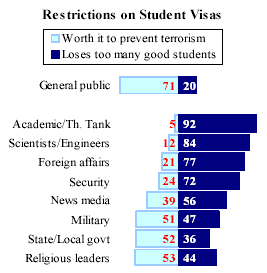
There is a broader split between the public and influential groups over the specific policy that increased restrictions on student visas as part of terrorism defenses. By a 71% to 20% margin, the American public believes these increased security measures are worth it in order to prevent terrorists from getting into the country. But most opinion leaders (67%), including 92% of academic and think-tank leaders and 84% of scientists and engineers, are of the view that such measures go to far because the U.S. loses too many good students to other countries.
While concern about losing too many good students prevails among many influential groups, about half of military leaders (51%), religious leaders (53%) and governors and mayors (52%) say these types of restrictions are worth the costs.




